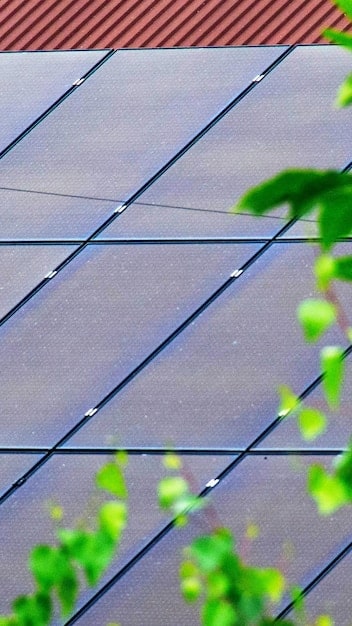Solar Tax Credits in 2025: What Homeowners Need to Know

Understanding how updated federal tax credits will impact your 2025 solar panel investment is crucial for homeowners looking to transition to renewable energy, potentially reducing costs and increasing long-term savings.
Planning to invest in solar panels in 2025? It’s essential to understand how will the updated federal tax credits impact your 2025 solar panel investment. These credits can significantly reduce the upfront costs and improve the overall return on investment, making solar energy more accessible and affordable for homeowners.
Understanding the Solar Investment Tax Credit (ITC)
The Solar Investment Tax Credit (ITC) is a federal incentive designed to boost solar energy adoption. Understanding its mechanics is crucial for anyone considering a solar panel installation.
What is the Solar ITC?
The ITC, also known as the federal solar tax credit, offers a significant tax credit to homeowners who invest in solar panel systems.
How Does the ITC Work?
The ITC allows you to deduct a percentage of the cost of your solar panel system from your federal taxes. This includes the cost of the panels, installation, and other related expenses. The exact percentage can vary based on the year the system is placed in service.
- The ITC reduces your federal tax liability.
- It covers a significant portion of your solar investment.
- It incentivizes homeowners to switch to solar energy.
The Solar ITC is a cornerstone of federal efforts to promote renewable energy, making solar power more affordable and accessible for homeowners across the United States.
Key Changes to the ITC in Recent Years
Recent legislative changes have significantly impacted the Solar Investment Tax Credit (ITC), affecting its availability and value for homeowners.
Inflation Reduction Act (IRA) and ITC
The Inflation Reduction Act (IRA) has extended and modified the ITC, providing long-term certainty for solar investments.
Extension of the ITC
The IRA extended the ITC at a rate of 30% for solar projects that begin construction before January 1, 2033. This extension offers stability and predictability for homeowners planning to invest in solar panels.

Understanding these changes is vital for homeowners planning a solar panel installation in 2025, as they determine the financial benefits available.
Navigating Eligibility for the Updated Tax Credits
To take full advantage of the updated federal tax credits for solar panel investments, homeowners must meet specific eligibility criteria.
Homeowner Requirements
To be eligible for the ITC, you must own the solar panel system and the home it is installed on.
System Requirements
The solar panel system must be new or used for the first time. Leased systems do not qualify for the ITC.
- Own your home and the solar panel system.
- Ensure the system is new or being used for the first time.
- Install the system at your primary or secondary residence in the United States.
Meeting these eligibility requirements is crucial for claiming the ITC and reducing your tax liability.
Maximizing Your Solar Investment in 2025
Maximizing your solar investment involves strategic planning and a thorough understanding of available incentives and financial considerations.
Sizing Your Solar System
Determine the appropriate size of your solar system based on your energy consumption and local climate conditions.
It’s typically recommend you hire a solar expert for this task.
Combining Federal and State Incentives
Explore opportunities to combine the federal ITC with state and local incentives to further reduce the cost of your solar panel system.

By making all considerations and making smart moves, you’re able to make the best decision to fit your lifestyle.
Potential Challenges and How to Overcome Them
Investing in solar panels can present challenges, but with careful planning, these obstacles can be overcome.
Financing Options
Explore different financing options, such as solar loans, to make the upfront investment more manageable.
Working with Qualified Installers
Choose experienced and reputable solar panel installers to ensure a smooth installation process.
- Research and compare different installers.
- Check for certifications and licenses.
- Read reviews and ask for references.
By addressing these potential challenges head-on, you can ensure a successful and rewarding solar panel investment. The key is to not give up, and remember the long-term goal!
Future Trends in Solar Energy and Tax Credits
The solar energy landscape is continually evolving, with new technologies emerging and potential changes to tax credit policies on the horizon.
Technological Advancements
Stay informed about advancements in solar panel technology, such as improved efficiency and energy storage solutions.
Policy Updates
Monitor any potential changes to federal and state tax credit policies to ensure you are maximizing available incentives. The policies change regularly at times!
Staying ahead of these trends will help you make informed decisions about your solar panel investment and maximize its long-term benefits. The important thing to remember is to stay up to date!
| Key Point | Brief Description |
|---|---|
| ☀️ ITC Extension | The ITC is extended at 30% for projects starting before 2033. |
| 🏡 Eligibility | Homeowners must own the system and the home to qualify. |
| 💰 Maximizing Investment | Combine federal and state incentives for maximum savings. |
| 🛠️ Overcoming Challenges | Explore financing options and choose qualified installers. |
Frequently Asked Questions
▼
The Solar Investment Tax Credit (ITC) is a federal tax credit that allows homeowners to deduct a percentage of the cost of their solar panel system from their federal taxes. It helps reduce the financial burden of going solar.
▼
To be eligible for the ITC, you must own the solar panel system and the home it’s installed on. The system must be new or used for the first time, and it must be installed at your primary or secondary residence in the United States.
▼
The Inflation Reduction Act (IRA) has extended the ITC at a rate of 30% for solar projects that begin construction before January 1, 2033. This extension offers long-term certainty for solar investments.
▼
Yes, you can often combine the federal ITC with state and local incentives to further reduce the cost of your solar panel system. Check with your state and local governments for available programs.
▼
Potential challenges include financing the upfront investment, choosing qualified installers, and staying informed about policy updates. Explore financing options, research installers thoroughly, and monitor changes to tax credit policies.
Conclusion
Understanding how will the updated federal tax credits impact your 2025 solar panel investment is essential for homeowners considering solar energy. By leveraging the ITC, exploring financing options, and staying informed about future trends, you can make a smart investment in renewable energy and enjoy long-term savings.




